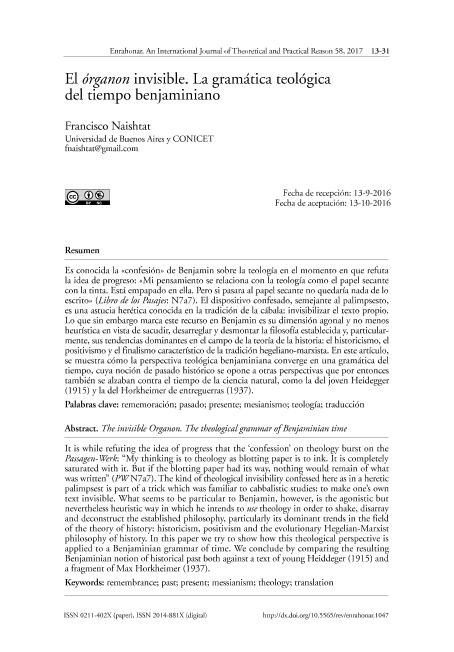Artículo
Es conocida la «confesión» de Benjamin sobre la teología en el momento en que refuta la idea de progreso: «Mi pensamiento se relaciona con la teología como el papel secante con la tinta. Está empapado en ella. Pero si pasara al papel secante no quedaría nada de lo escrito» (Libro de los Pasajes: N7a7). El dispositivo confesado, semejante al palimpsesto, es una astucia herética conocida en la tradición de la cábala: invisibilizar el texto propio. Lo que sin embargo marca este recurso en Benjamin es su dimensión agonal y no menos heurística en vista de sacudir, desarreglar y desmontar la filosofía establecida y, particularmente, sus tendencias dominantes en el campo de la teoría de la historia: el historicismo, el positivismo y el finalismo característico de la tradición hegeliano-marxista. En este artículo, se muestra cómo la perspectiva teológica benjaminiana converge en una gramática del tiempo, cuya noción de pasado histórico se opone a otras perspectivas que por entonces también se alzaban contra el tiempo de la ciencia natural, como la del joven Heidegger (1915) y la del Horkheimer de entreguerras (1937). It is while refuting the idea of progress that the ‘confession’ on theology burst on the Passagen-Werk: “My thinking is to theology as blotting paper is to ink. It is completely saturated with it. But if the blotting paper had its way, nothing would remain of what was written” (PW N7a7). The kind of theological invisibility confessed here as in a heretic palimpsest is part of a trick which was familiar to cabbalistic studies: to make one’s own text invisible. What seems to be particular to Benjamin, however, is the agonistic but nevertheless heuristic way in which he intends to use theology in order to shake, disarray and deconstruct the established philosophy, particularly its dominant trends in the field of the theory of history: historicism, positivism and the evolutionary Hegelian-Marxist philosophy of history. In this paper we try to show how this theological perspective is applied to a Benjaminian grammar of time. We conclude by comparing the resulting Benjaminian notion of historical past both against a text of young Heiddeger (1915) and a fragment of Max Horkheimer (1937).
El órganon invisible. La gramática teológica del tiempo benjaminiano
Título:
The invisible Organon. The theological grammar of Benjaminian time
Fecha de publicación:
03/2017
Editorial:
Universidad Autónoma de Barcelona. Departamento de Filosofía
Revista:
Enrahonar
ISSN:
0211-402X
Idioma:
Español
Tipo de recurso:
Artículo publicado
Clasificación temática:
Resumen
Palabras clave:
Rememoracion
,
Pasado
,
Presente
,
Mesianismo
Archivos asociados
Licencia
Identificadores
Colecciones
Articulos(SEDE CENTRAL)
Articulos de SEDE CENTRAL
Articulos de SEDE CENTRAL
Citación
Naishtat, Francisco; El órganon invisible. La gramática teológica del tiempo benjaminiano; Universidad Autónoma de Barcelona. Departamento de Filosofía; Enrahonar; 1; 58; 3-2017; 13-31
Compartir
Altmétricas




